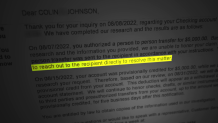A Lakeview man says he was recently robbed twice: First, by a pair of muggers, then by his bank.
Much of 24-year-old Colin Johnson’s savings account was drained by thieves who used a popular banking app to do the damage; one that is now under fire by lawmakers.
The trouble started on a hot and humid Saturday night last August when Johnson said after a night out with friends, he decided to call it early and head home, walking down Belmont Avenue.
Before he could process what was going on, Johnson said two men approached him out of nowhere, demanding everything he had.
“Obviously, I just handed over my phone and wallet,” Johnson recalled, “And they took off. It’s all kind of a blur.”
Johnson made it to a nearby Walgreens to call Chicago Police for help, and report the strong-armed robbery. Officers took the report, but the assailants had vanished into the night.
Banking records show where they went next: Johnson’s savings account.
“They were able to get into all of my apps right away,” he said. “They were able to change all of my passwords. That’s where the real damage started.”
The thieves did not force Johnson to unlock his phone, yet somehow they managed to do that on their own and immediately began transferring funds from his savings to his checking account.
That’s when the withdrawals started: Hundreds of dollars withdrawn from ATM’s across the North Side, as well as a debit transaction at a Walmart in Skokie.
Feeling out of the loop? We'll catch you up on the Chicago news you need to know. Sign up for the weekly Chicago Catch-Up newsletter.
In addition to the physical withdrawals, another $10,000 was transferred electronically over Zelle, doled out from Johnson’s checking account.
All told, more than $11,000 of Johnson’s savings was gone: Money he had saved up since eighth grade, working as a golf caddy during his summers.
“I almost fell to my knees with how shocked I was,” Johnson said.
But the shock he felt then did not compare to what lied ahead.
Johnson assumed his federally-insured bank, Citibank, would reimburse the lost funds and have his back.
Instead, quite the opposite happened: In the months that followed the robbery, Citibank declined Johnson’s multiple requests for refunds, as well as his appeals, arguing that Johnson had authorized the money transfers.
This, despite Johnson sharing with Citibank’s fraud department the police report documenting the crime that occurred.
After initially refunding the money robbed from Johnson’s savings, Citibank clawed back those funds, over drafting his checking accounts.
In one of the letters Citibank sent Johnson, explaining the bank’s denial decision, Johnson said the bank offered a bizarre piece of advice.
“They wrote, ‘You may wish to reach out to the recipient directly to resolve this matter,’” Johnson explained, reading from the letter. “I don't know where to begin with that because I don't know who this person is, I don't know where they live. And, even if I did, I'm not going to show up to their door, knock, and demand my money back… It’s absurd.”

Johnson shared with NBC 5 Responds the letter, as well as a notarized affidavit Johnson provided Citibank, swearing to the fact that he was robbed. But his appeals did not work, Citibank refused to refund what he had lost.
Another victim on the long-list of those who’ve complained about banks not supporting customers who fall victim to Zelle fraud, including consumer advocates.
“It's clear that Zelle is not interested and the banks that are behind it are not interested in helping people, especially if they've been defrauded,” said Kevin Brasler with Consumers’ Checkbook.
The major banks that own Zelle, including banks using its services like Citi, are now facing pressure from lawmakers over their less-than consumer friendly refund policies when fraud occurs.
Zelle and its parent company, Early Warning Services, has told NBC 5 it’s just the messenger: Communicating money transfers from one bank to another, never actually holding the funds, and that only the banks involved can make those kinds of refund decisions.
While many banks have argued customers are responsible for their own accounts, lawmakers have said federally-insured banks have a legal obligation to stand by those customers.
After months of back and forth with Citi, denial after denial, Johnson contacted NBC 5 Responds. The day after NBC 5 contacted Citibank, Johnson said he received a phone call.
“I got a call from Citibank saying, ‘We'd like to honor all of your claims and you'll be receiving all of your money shortly,’” Johnson said. “Convenient timing, if you ask me… They declined [my requests] 15 times over five months.”
When asked if someone from Citibank had actually reviewed Johnson’s refund request, including the police report he attached, a spokesperson for Citibank told NBC 5, “Citibank carefully reviews all supporting documentation provided by our clients. And in this case, our fraud team reviewed supporting documentation multiple times.”
“We have a great deal of sympathy for those who fall victim to financial fraud,” Citibank’s statement about Johnson’s experience reads. “Every fraud case is different, and we are pleased to have resolved this matter with our customer.”
Johnson said he’s still waiting on a small portion of refunds from Citibank, but the majority of what he lost is now back in his savings account.
While relieved with the end result, Johnson said the fight with his bank was worse than the physical altercation and robbery it all started with.
“The struggle with Citibank was about 10 times worse than the actual ordeal,” Johnson said.



